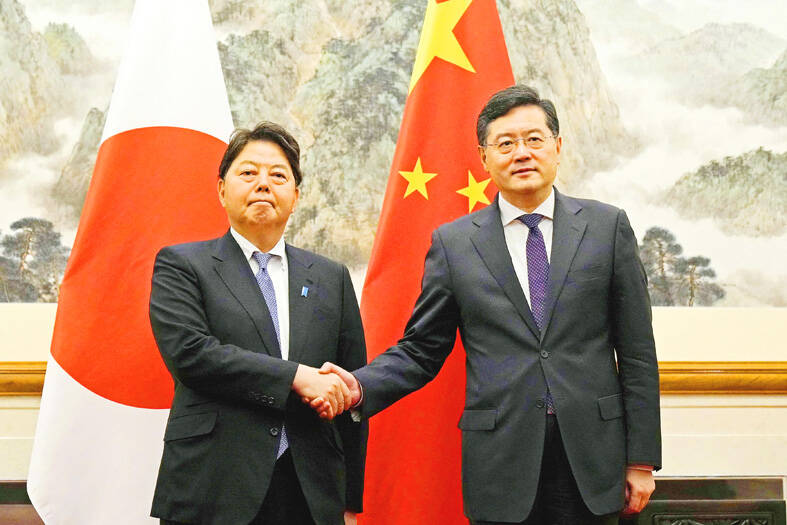Japanese Minister of Foreign Affaris Yoshimasa Hayashi, meeting his Chinese counterpart yesterday, spoke of the importance of peace in the Taiwan Strait and urged Beijing to promptly release a detained Japanese national.
Hayashi’s meeting with Chinese Minister of Foreign Affairs Qin Gang (秦剛) was the first visit to Beijing by a Japanese foreign minister in more than three years, as the two rival Asian powers seek common ground amid rising regional tensions.
The Japanese minister said he conveyed Tokyo’s grave concerns over an increase of China’s military activity, including its closeness with Russia and its maritime presence in the East China Sea.

Photo: Kyodo via Reuters
“We both affirmed the importance of continuing to have a dialogue on issues including national security,” Hayashi said.
He said he spoke to Qin about the “importance of ensuring peace and stability in the Taiwan Strait.” Beijing said that Qin told Japan “not to interfere in the Taiwan issue or undermine China’s sovereignty in any form,” stressing that Taiwan is “the core of China’s core interests.”
Japan lodged a diplomatic complaint in August last year after five ballistic missiles launched by the Chinese People’s Liberation Army, in response to then-US House of Representatives Nancy Pelosi’s visit to Taiwan, landed in Japan’s exclusive economic zone.
Meanwhile, an employee of Astellas Pharma Inc was detained in China for unknown reasons, a company spokesperson said a week ago.
At least 16 other Japanese have been detained in China on suspicion of spying since 2015, Japan’s Kyodo News has reported.
“I made a protest against the recent detention of a Japanese person in Beijing, and made a strong point of our position on the matter, including the early release of this national,” Hayashi told reporters.
Qin said that China “will handle [the case] according to the law,” a readout from the Chinese Ministry of Foreign Affairs said.
Hayashi said Japan is seeking transparency over the legal process regarding detentions and has asked for China to secure a fair and safe business environment.
After Tokyo on Friday announced export restrictions on semiconductor manufacturing equipment, following the US, Qin told his counterpart “not to play accomplice to an evildoer.”
Hayashi told reporters that the restrictions “are not aimed at any specific country.”
Despite their differences, China and Japan agreed to restart trilateral talks with South Korea, Hayashi said, calling the agreement “an important achievement” from his meeting with Qin.

Taiwan is projected to lose a working-age population of about 6.67 million people in two waves of retirement in the coming years, as the nation confronts accelerating demographic decline and a shortage of younger workers to take their place, the Ministry of the Interior said. Taiwan experienced its largest baby boom between 1958 and 1966, when the population grew by 3.78 million, followed by a second surge of 2.89 million between 1976 and 1982, ministry data showed. In 2023, the first of those baby boom generations — those born in the late 1950s and early 1960s — began to enter retirement, triggering

ECONOMIC BOOST: Should the more than 23 million people eligible for the NT$10,000 handouts spend them the same way as in 2023, GDP could rise 0.5 percent, an official said Universal cash handouts of NT$10,000 (US$330) are to be disbursed late next month at the earliest — including to permanent residents and foreign residents married to Taiwanese — pending legislative approval, the Ministry of Finance said yesterday. The Executive Yuan yesterday approved the Special Act for Strengthening Economic, Social and National Security Resilience in Response to International Circumstances (因應國際情勢強化經濟社會及民生國安韌性特別條例). The NT$550 billion special budget includes NT$236 billion for the cash handouts, plus an additional NT$20 billion set aside as reserve funds, expected to be used to support industries. Handouts might begin one month after the bill is promulgated and would be completed within

NO CHANGE: The TRA makes clear that the US does not consider the status of Taiwan to have been determined by WWII-era documents, a former AIT deputy director said The American Institute in Taiwan’s (AIT) comments that World War-II era documents do not determine Taiwan’s political status accurately conveyed the US’ stance, the US Department of State said. An AIT spokesperson on Saturday said that a Chinese official mischaracterized World War II-era documents as stating that Taiwan was ceded to the China. The remarks from the US’ de facto embassy in Taiwan drew criticism from the Ma Ying-jeou Foundation, whose director said the comments put Taiwan in danger. The Chinese-language United Daily News yesterday reported that a US State Department spokesperson confirmed the AIT’s position. They added that the US would continue to

The National Development Council (NDC) yesterday unveiled details of new regulations that ease restrictions on foreigners working or living in Taiwan, as part of a bid to attract skilled workers from abroad. The regulations, which could go into effect in the first quarter of next year, stem from amendments to the Act for the Recruitment and Employment of Foreign Professionals (外國專業人才延攬及僱用法) passed by lawmakers on Aug. 29. Students categorized as “overseas compatriots” would be allowed to stay and work in Taiwan in the two years after their graduation without obtaining additional permits, doing away with the evaluation process that is currently required,